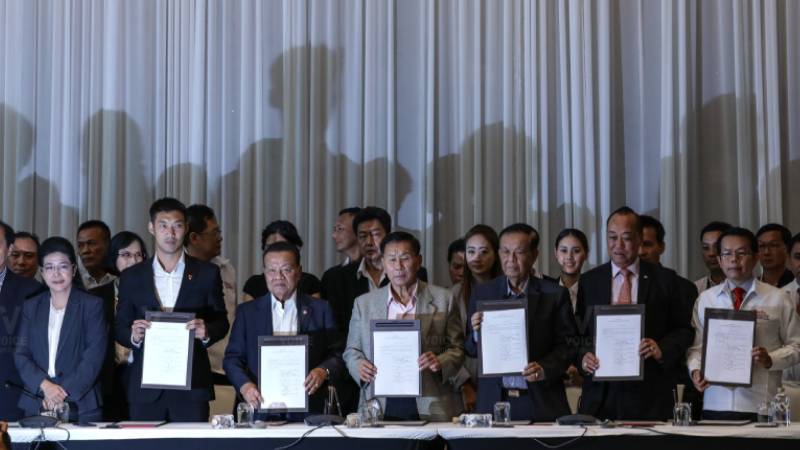Several anti-junta parties formed a coalition in Thailand today, vowing to thwart a military-backed party in a bid to end years of junta rule following the country’s first vote since a 2014 coup.
Thai politics are deadlocked after Sunday’s vote, with two main rival parties claiming the right to govern amid allegations of ballot irregularities and the full official results yet to be released.
Seven anti-junta parties, led by the Pheu Thai Party, said they would join forces, claiming to win enough parliamentary seats to form a government and sideline military-backed allies led by the Phalang Pracharat Party.
“We want to stop the regime from hanging onto power,” Pheu Thai’s prime ministerial candidate Sudarat Keyuraphan said at a press conference Wednesday announcing the coalition.
The bloc of seven — which includes the youth-focused Future Forward Party that did surprisingly well in the elections — claimed it would take 255 out of the 500 lower house seats that are up for grabs.
“It is a complete process of setting up a government,” said Future Forward’s telegenic billionaire leader Thanathorn Juangroongruangkit.
Pheu Thai has won every election since 2001 and is affiliated with self-exiled former premier Thaksin Shinawatra.
Thaksin’s sister Yingluck was herself ousted in the 2014 putsch, and is also living in self-exile.
The newly-formed coalition said it wanted to usher in an era of pro-democracy politics following Sunday’s vote.
“We will cooperate with parties that are at this press conference today no matter what obstacles ahead… we are ready to stop the regime from holding on to power,” Thanathorn told reporters.
The military-backed Phalang Pracharat, led by junta chief and prime ministerial candidate Prayut Chan-O-Cha, won the popular vote with 7.6 million ballots in its favour — 400,000 more votes than Pheu Thai.
Phalang Pracharat has also said it expects to secure more than half of all seats in the lower house.
The balance of power is stacked in favour of the junta due to a charter it drafted creating 250 military-appointed upper house seats.
That means non-military parties like Pheu Thai need an avalanche of votes in order to vote in a prime minister.
The Election Commission has unexpectedly delayed releasing official results, and questions are now swirling over election irregularities, with an election monitor saying the tabulation was “deeply flawed”.
Nearly two million invalidated ballots, weak polling oversight and bungling by election authorities may have wildly skewed initial numbers.




